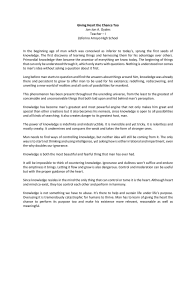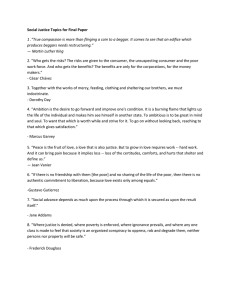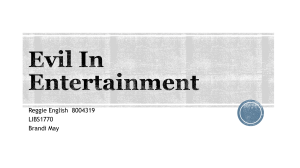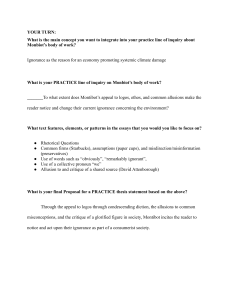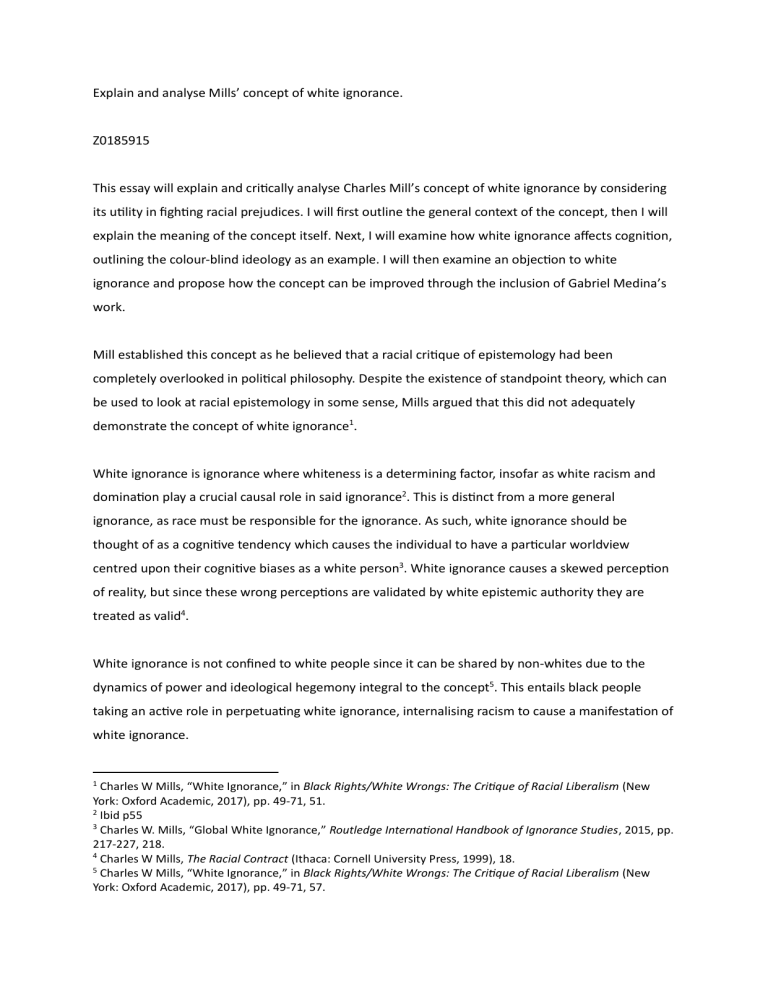
Explain and analyse Mills’ concept of white ignorance. Z0185915 This essay will explain and critically analyse Charles Mill’s concept of white ignorance by considering its utility in fighting racial prejudices. I will first outline the general context of the concept, then I will explain the meaning of the concept itself. Next, I will examine how white ignorance affects cognition, outlining the colour-blind ideology as an example. I will then examine an objection to white ignorance and propose how the concept can be improved through the inclusion of Gabriel Medina’s work. Mill established this concept as he believed that a racial critique of epistemology had been completely overlooked in political philosophy. Despite the existence of standpoint theory, which can be used to look at racial epistemology in some sense, Mills argued that this did not adequately demonstrate the concept of white ignorance1. White ignorance is ignorance where whiteness is a determining factor, insofar as white racism and domination play a crucial causal role in said ignorance2. This is distinct from a more general ignorance, as race must be responsible for the ignorance. As such, white ignorance should be thought of as a cognitive tendency which causes the individual to have a particular worldview centred upon their cognitive biases as a white person3. White ignorance causes a skewed perception of reality, but since these wrong perceptions are validated by white epistemic authority they are treated as valid4. White ignorance is not confined to white people since it can be shared by non-whites due to the dynamics of power and ideological hegemony integral to the concept5. This entails black people taking an active role in perpetuating white ignorance, internalising racism to cause a manifestation of white ignorance. 1 Charles W Mills, “White Ignorance,” in Black Rights/White Wrongs: The Critique of Racial Liberalism (New York: Oxford Academic, 2017), pp. 49-71, 51. 2 Ibid p55 3 Charles W. Mills, “Global White Ignorance,” Routledge International Handbook of Ignorance Studies, 2015, pp. 217-227, 218. 4 Charles W Mills, The Racial Contract (Ithaca: Cornell University Press, 1999), 18. 5 Charles W Mills, “White Ignorance,” in Black Rights/White Wrongs: The Critique of Racial Liberalism (New York: Oxford Academic, 2017), pp. 49-71, 57. I hold that Mills’ concept is useful in combating racial prejudices since it recognises how racism is not simply a matter of individual prejudice yet a systemic ideology that operates through social norms and institutions. As such, it allows the individual to challenge their cognitive biases through the process of understanding how social structures tend to promote flawed cognitive processes, removing oneself from them and undermining them6. In this way, the implications of the concept are normative rather than purely sociological. Mills’ concept of white ignorance is also useful as it allows us to understand how racial ignorance affects cognition. An individual’s perception of concepts will be geared towards a certain understanding, and in the case of white ignorance, this means that this perception will be influenced by racial prejudice. Since white people hold a position of dominant power, the conceptual apparatus through which individuals perceive their lives are shaped by the biases of white people. Racial prejudice therefore has a direct, causal link to cognition, which enables epistemic principles such as “white normativity” to dominate epistemology. “White normativity” is the centring of the EuroAmerican reference group as the constitutive norm of epistemic power7. It promotes a conviction of superiority that seems vindicated by the facts, which in turn shapes the perception of the facts to uphold this. A contemporary example of white ignorance can be found in the concept of “colour-blindness”, the idea of ‘not seeing race’, which enables whites to believe that non-whites are equals and therefore there is no need to undertake measures to repair the inequalities of the past. In this case, white normativity is manifesting itself in the white refusal to recognise that structural discrimination has left whites with differential resources and advantages8. As such, the worldview that is promoted emphasises individualistic explanations for socioeconomic achievement, as if the individualism of white privilege was a universal attribute. Racial exploitation has been central to global history and the vested white interests in the maintenance of the racial status quo must be recognised as a major factor in encouraging white ignorance9. We can begin to deconstruct such ideologies through the recognition of white ignorance’s role in them. 6 Ibid p59. Ibid p61. 8 Ibid p63. 9 Ibid p70. 7 Despite Mills’ concept being useful in the combating of racial prejudices to some extent, I believe that it can be interpreted as absolving the white individual from epistemic responsibility for their role in upholding white ignorance. The concept of white ignorance supports the narrative that white people are unaware of their role in upholding systematic racism and act as ignorant puppets at the mercy of unconscious racial biases. I hold Marzia Milazzo’s argument that the origin of this narrative can be seen in Mills’ misinterpretation of Ralph Ellison’s Invisible Man, which he uses as proof of the concept in early black literature. Milazzo argues the story challenges white ignorance by arguing that whilst white people may live in a ‘dream world’ where blacks are ‘invisible’, white people have created and perpetuated this and therefore are responsible for it.10 As such, white ignorance is deficient in presenting whites as ignorant puppets since white people refuse to ‘see’ the invisible man because it benefits them, and as such are not puppets yet actively engaging with their ignorance. However, I maintain that this issue with white ignorance can be remedied with the inclusion of Medina’s concept of active ignorance. Active ignorance is that which occurs with the active participation of the subject, involving the use of defence mechanisms to deflect criticism.11 By identifying that white ignorance is a form of active ignorance, the concept can deflect Milazzo’s criticisms since it acknowledges the subject’s active role in perpetuating white ignorance. White ignorance consists in being cognitively and affectively numbed to the impact of racial prejudices on non-whites, and this is maintained using defence mechanisms. For example, a lack of openness to discuss racial problems is used as a defence mechanism as it removes the possibility of race being acknowledged as an issue. Therefore, white ignorance is active ignorance. Mills’ concept can be further developed through an inclusion of the concept of meta-ignorance as this will allow for greater utility in fighting racial prejudice. Meta-ignorance occurs when the subject is “numbed to their own numbness”, meaning that they are unaware of their ignorance and are incapable of recognising the mechanisms which produced their ignorance.12 This does not mean that the subject is a puppet to their ignorance, as they are still an active participant, yet it is invisible to them. The type of meta-ignorance that should be included in Mills’ concept is active meta-ignorance, 10 Marzia Milazzo, “On White Ignorance, White Shame, and Other Pitfalls in Critical Philosophy of Race,” Journal of Applied Philosophy 34, no. 4 (March 2016): pp. 557-572, https://doi.org/10.1111/japp.12230, 566. 11 José Medina, “Ignorance and Racial Insensitivity,” The Epistemic Dimensions of Ignorance, 2016, pp. 178-201, https://doi.org/10.1017/9780511820076.011, 182. 12 Ibid 184 which entails a resistance to epistemic friction meaning that the path to recognising their ignorance is blocked. A clear example of active meta-ignorance can be seen in the colour-blind ideology. The colour-blind ideology requires the individual to be both ignorant of their white privilege and ignorant of the impact of historic racism on minorities.13 It is an example of active meta-ignorance as the subject demonstrates a refusal to accept that their whiteness affords them privilege due to historic oppression. As such, the subject will actively resist epistemic friction through defence mechanisms. Epistemic friction occurs in communicative interactions when different perspectives contest each other, and this kind of friction is required for becoming sensitive to different perspectives.14 I believe that through epistemic interventions in which the individual experiences epistemic friction, one can challenge racial prejudices and begin to dismantle the defence mechanisms that uphold them. Including Medina’s ideas into Mills’ concept allows for a more useful concept of white ignorance, one in which the subject is recognised as having an active role in their ignorance and retains epistemic responsibility for this. I also hold that the inclusion of concepts such as epistemic friction allows for greater progress in fighting racial prejudices since it provides a framework for combating them through epistemic interventions. To conclude, in this essay I have outlined the original concept of Mills’ white ignorance and have also considered an objection as a means of improving the concept. I argued that Mills’ concept of white ignorance can be improved through an inclusion of Medina’s work. Therefore, I hold that whilst Mills’ original concept is useful in fighting racial prejudices, it can be improved through an incorporation of Medina’s ideas. 13 José Medina, “Active Ignorance, Epistemic Others, and Epistemic Friction,” The Epistemology of Resistance, January 2013, pp. 27-55, https://doi.org/10.1093/acprof:oso/9780199929023.003.0001, 38. 14 José Medina, “Ignorance and Racial Insensitivity,” The Epistemic Dimensions of Ignorance, 2016, pp. 178-201, https://doi.org/10.1017/9780511820076.011, 184. Bibliography Medina, José. “Active Ignorance, Epistemic Others, and Epistemic Friction.” The Epistemology of Resistance, 2013, 27–55. https://doi.org/10.1093/acprof:oso/9780199929023.003.0001. Medina, José. “Ignorance and Racial Insensitivity.” The Epistemic Dimensions of Ignorance, 2016, 178–201. https://doi.org/10.1017/9780511820076.011. Milazzo, Marzia. “On White Ignorance, White Shame, and Other Pitfalls in Critical Philosophy of Race.” Journal of Applied Philosophy 34, no. 4 (2016): 557–72. https://doi.org/10.1111/japp.12230. Mills, Charles W. “Global White Ignorance.” Routledge International Handbook of Ignorance Studies, 2015, 217–27. https://doi.org/10.4324/9781315867762-27. Mills, Charles W. “White Ignorance.” Essay. In Black Rights/White Wrongs: The Critique of Racial Liberalism, edited by Charles W Mills, 49–71. New York: Oxford Academic, 2017. Mills, Charles W. The Racial Contract. Ithaca: Cornell University Press, 1999.
